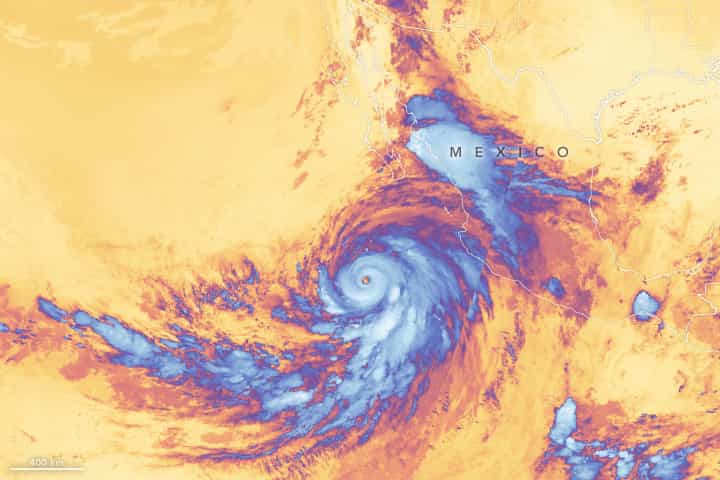
Hurricane Hilary, a category 4 storm in the Pacific Ocean, approached the Baja California peninsula on August 18, 2023.
The Visible Infrared Imaging Radiometer Suite (VIIRS) on the NOAA-20 satellite acquired this image of Hilary in the predawn hours of August 18 (09:25 Universal Time), when the eye of the storm was about 400 miles (640 kilometers) off the coast of the peninsula. The image shows infrared brightness temperature data, which is useful for distinguishing cooler cloud structures (white and blue) from warmer surfaces below (yellow). The coolest temperatures are generally associated with the tallest clouds.
As of 9 a.m. Mountain Time (15:00 Universal Time) on August 18, Hilary had maximum sustained winds near 145 miles (230 kilometers) per hour, according to the National Hurricane Center, making it a category 4 hurricane on the Saffir-Simpson wind scale. Hilary formed as a tropical storm off the coast of Manzanillo, Mexico, on August 16. Between August 17 and August 18, Hilary intensified quickly from a tropical storm to a forceful category 4 hurricane.
The National Hurricane Center expects Hilary to continue moving north-northwest and weaken before reaching the center of the peninsula by the evening of August 19. Then, by the evening of August 20, the storm is forecast to move inland over Southern California and drench cities such as San Diego and Los Angeles with heavy rain. Scientists at NASA’s Short-term Prediction Research and Transition Center (SPoRT) expected that the heavy rain could saturate soils in the region for several days after the storm.
The Government of Mexico issued a hurricane warning for the Baja California peninsula from Punta Abreojos to Punta Eugenia. The U.S. National Hurricane Center issued a tropical storm watch for portions of Southern California, including San Diego and north up to Huntington Beach. This is the first time the center has issued a watch for that region.
This post first appeared on NASA Earth Observatory. NASA Earth Observatory image by Lauren Dauphin, using VIIRS data from NASA EOSDIS LANCE, GIBS/Worldview, and the Joint Polar Satellite System (JPSS). Story by Emily Cassidy.